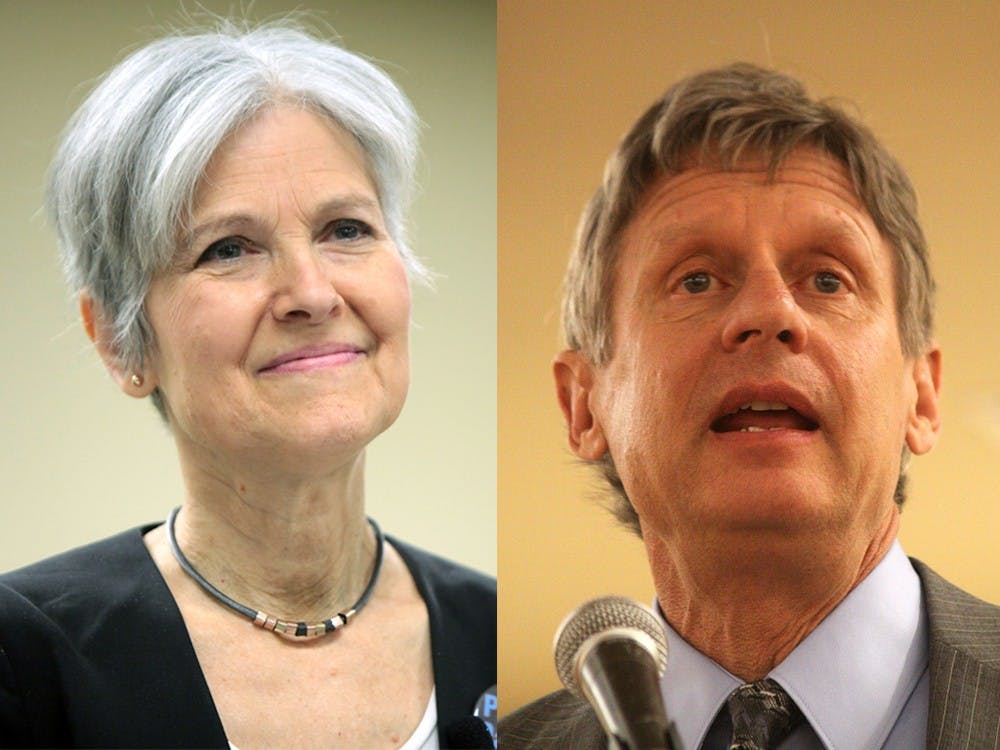With the presidential election approaching, organizations on Grounds favoring third-party presidential candidates have been gathering support.
Youth for Gary Johnson Chapter President Cameron Springer, a third-year Engineering student, said an early focus of the organization was to get ballot signatures in support of Libertarian presidential candidate Gary Johnson.
“The [University Democrats] and College Republicans have a leg up on us because they have already in place a political apparatus that we don’t have,” Springer said. “While there are Libertarian groups on Grounds, they’re all philosophical so they can’t help us campaign.”
Springer described the campaign style of the group as reflective of Libertarian ideals.
“Gary Johnson always says that Libertarians want to stay out of your bedroom and out of your pocket,” Springer said. “Libertarians want to leave you alone. We try to emphasize that in our campaign. We’re not going to force you to take brochures. A vote for us is a vote to leave you the hell alone.”
Students for Individual Liberty — a nonprofit group on Grounds — cannot officially endorse any presidential candidate because of their nonprofit status; however, Grace Charlton, a fourth-year Batten student and co-chairman of the organization, said many of the members are backing Johnson.
“We happen to align on almost all the issues with Gary Johnson,” Charlton said.
Charlton noted Johnson has already earned an official place on the presidential electoral ballot in all 50 states and the District of Columbia. However, according to a RealClearPolitics poll, Johnson is only polling at 8.2 percent, which makes him ineligible to participate in a presidential debate by the Commission on Presidential Debate’s standards.
There is currently no active Green Party chapter on Grounds, but Green Party of Virginia Co-Chair Sidney Smith encouraged interested students to found a Young Greens chapter. Smith noticed a large increase in support for the Green Party after Sen. Bernie Sanders (I-VT) conceded the Democratic nomination to former Secretary of State Hillary Clinton in July.
“Bernie Sanders helped people see that there’s another approach other than neoliberalism,” Smith said. “So that got a lot of people, young people, very interested in the possibility of real change, positive change … we are where the revolution continues.”
Smith said the Green Party spent the summer focusing on their ballot access drive, and recently earned 5,000 validated signatures, granting the party’s nominee Jill Stein a place on the ballot in Virginia as well. Support for the Green Party also grew after Stein visited in May and Sanders conceded the race over the summer, Smith said.
“[The] downside is all of that took place during the summer break,” Smith said. “Now that students are back, we need to focus on organizing.”
Barbara Perry, director of presidential studies at the Miller Center, said third parties have an important influence on presidential elections, not only by affecting the outcome of an election but also the actions the president takes after being elected.
For example, after Ross Perot ran as a single-issue candidate in favor for balancing the national budget, both then-President Bill Clinton and the majority Republican Congress worked together to balance the budget.
“Both major parties are noticing this upset in the American electorate, which has propelled [Donald] Trump to become the candidate and created major competition between Sanders and Clinton,” Perry said. “Most of the time, the two parties know they have to notice when they see a movement from a non-mainstream person.”
Perry said she believes the two-party system is so established in American government that electing a third party would require a huge change in the entire political system. As a result, the two major political parties often reach out to third-party voters and absorb some of their beliefs.
“Parties are sailing a big ship,” Perry said. “You can’t turn a ship around very quickly, because it’s very big. You constantly have to see what way the wind is blowing and adjust your sails.”
Springer also recognized the influence of third parties in developing the political platforms of the two major parties.
“Our goal is to change policies to make the government more libertarian and less interfering in our lives,” Springer said. “But we’d like to win too.”







